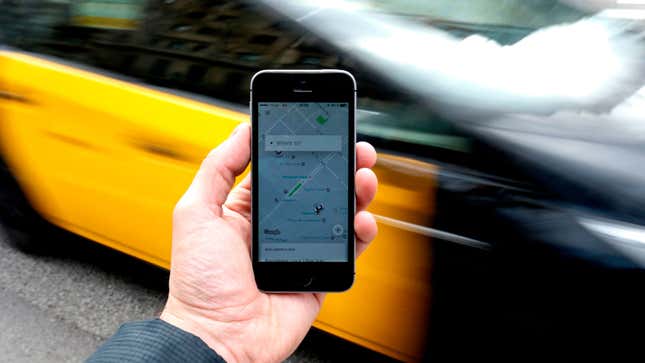
California’s Air Resources Board submitted an ambitious proposal in recent days that would put a cap on emissions from vehicles being used for rideshare apps like Uber and Lyft, Wired reports. And while these companies have an infamously tumultuous history with labor regulators in their home state, they seem significantly more receptive to this push to go green than they are to sufficiently compensating their workforce.
The proposal would mandate that 60% percent of miles traveled by Uber and Lyft vehicles be in electric vehicles by 2030. To achieve this lofty goal, the board estimates that roughly one-third of rideshare vehicles would need to be electric.
That’s a tall order, to put it lightly. In 2018, electric vehicles only made up 1% of miles traveled for ridesharing services (only 59% more to go!). In their proposal, the board suggested that companies like Uber and Lyft would need to offer incentives for their contractors to make the switch and particularly target their highest-mileage drivers.
Lyft, which earlier this year committed to convert all of its drivers’ vehicles to electric by 2030, welcomed the stricter regulation.
“We think that CARB should continue to be aggressive,” Sam Arons, the company’s head of sustainability, told Wired, using the acronym for the board.
Lyft aims to collaborate with automakers and invest more in its driver rental program, Express Drive, in an effort to hit that 60% goal, Arons continued. He said that according to Lyft’s research, drivers who rent their vehicles from third-party rental companies drive more miles (likely because they have to earn enough to keep those rental costs from eating into their already slim profit margin). So if Lyft brokers a deal with automakers to sell electric vehicles to rental companies at a reduced cost, the company argues that it’s a win for everyone involved.
Well, except the Lyft drivers. They just live to get screwed over another day.
While Uber hasn’t made any similar commitments regarding electric vehicles, a company spokesperson told Wired that Uber “looks forward to continuing to engage with CARB,” and that it “supports California’s Clean Miles Standard as a first of its kind performance-driven standard.”
The state’s Clean Miles Standard aims to come up and implement a new set of rules for transportation companies to curb greenhouse gas emissions even as transportation technology evolves.
Obviously the more cars that go electric the better, but in reality it’s difficult to gauge the exact percentage of air-polluting emissions that Uber and Lyft vehicles contribute every day. One scientific study estimated that ridesharing trips can cause roughly 69% more pollution on average than the low-carbon trips they’re displacing, such as riding the bus, biking, or walking.
State regulators are posed to discuss the ridesharing industry’s conversion to electric in January 2021. Hopefully, the world will be a little less of a raging trash fire by then. One can hope, anyway.
[Wired]